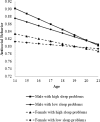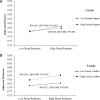The Effects of Sleep Problems on the Trajectory of Antisocial Behavior from Adolescence through Early Adulthood in Taiwan: Family Functioning as a Moderator
- PMID: 27166239
- PMCID: PMC4909626
- DOI: 10.5665/sleep.5980
The Effects of Sleep Problems on the Trajectory of Antisocial Behavior from Adolescence through Early Adulthood in Taiwan: Family Functioning as a Moderator
Abstract
Study objectives: To examine the longitudinal relationship between sleep problems and development of antisocial behavior from adolescence through young adulthood, and to investigate whether family functioning moderates the association being examined. Potential sex differences were also explored.
Methods: A total of 2,491 adolescents participated in a prospective study spanning 2009 through 2014 in northern Taiwan. Measures included sleep problems, family functioning (parental support, family interaction, and family conflict), antisocial behavior, and other individual characteristics (sex, age, parental education, family economic stress, depressive symptoms, and stressful life events). Random coefficient growth models were used to test study hypotheses.
Results: Sleep problems were significantly and positively associated with antisocial behavior (B = 0.088 and 0.038 for males and females, respectively). Sex differences further emerged in the moderating effects of family functioning. Among males, those with high family interaction had a weaker association between sleep problems and antisocial behavior; among females, the examined association was weaker in those with high parental support. For both sexes, the association between sleep problems and antisocial behavior was stronger for those with high family conflict.
Conclusions: Our findings highlight the robust link between sleep problems and adolescent antisocial behavior over time. We also show for the first time that the association depends on family functioning. Prevention methods and treatment of sleep problems in youths that incorporate family functioning may yield significant benefits for decreasing antisocial behavior. Sex-specific intervention and prevention approaches should also be considered.
Keywords: adolescence; antisocial behavior; family functioning; sleep problems.
© 2016 Associated Professional Sleep Societies, LLC.
Figures



References
-
- Shochat T, Cohen-Zion M, Tzischinsky O. Functional consequences of inadequate sleep in adolescents: a systematic review. Sleep Med Rev. 2014;18:75–87. - PubMed
-
- Luntamo T, Sourander A, Santalahti P, Aromaa M, Helenius H. Prevalence changes of pain, sleep problems and fatigue among 8-year-old children: years 1989, 1999, and 2005. J Pediatr Psychol. 2012;37:307–18. - PubMed
MeSH terms
LinkOut - more resources
Full Text Sources
Other Literature Sources
Medical

